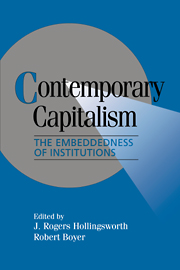Book contents
- Frontmatter
- Contents
- Acknowledgments
- List of Contributors
- Chapter 1 Coordination of Economic Actors and Social Systems of Production
- PART I THE VARIETY OF INSTITUTIONAL ARRANGEMENTS AND THEIR COMPLEMENTARITY IN MODERN ECONOMIES
- PART II HOW AND WHY DO SOCIAL SYSTEMS OF PRODUCTION CHANGE?
- PART III LEVELS OF SPATIAL COORDINATION AND THE EMBEDDEDNESS OF INSTITUTIONS
- Chapter 10 Perspectives on Globalization and Economic Coordination
- Chapter 11 Globalization in Question: International Economic Relations and Forms of Public Governance
- Chapter 12 Clubs are Trump: The Formation of International Regimes in the Absence of a Hegemon
- Chapter 13 The Emerging Europolity and Its Impact upon National Systems of Production
- PART IV CONCLUSION
- Index
Chapter 13 - The Emerging Europolity and Its Impact upon National Systems of Production
Published online by Cambridge University Press: 05 June 2012
- Frontmatter
- Contents
- Acknowledgments
- List of Contributors
- Chapter 1 Coordination of Economic Actors and Social Systems of Production
- PART I THE VARIETY OF INSTITUTIONAL ARRANGEMENTS AND THEIR COMPLEMENTARITY IN MODERN ECONOMIES
- PART II HOW AND WHY DO SOCIAL SYSTEMS OF PRODUCTION CHANGE?
- PART III LEVELS OF SPATIAL COORDINATION AND THE EMBEDDEDNESS OF INSTITUTIONS
- Chapter 10 Perspectives on Globalization and Economic Coordination
- Chapter 11 Globalization in Question: International Economic Relations and Forms of Public Governance
- Chapter 12 Clubs are Trump: The Formation of International Regimes in the Absence of a Hegemon
- Chapter 13 The Emerging Europolity and Its Impact upon National Systems of Production
- PART IV CONCLUSION
- Index
Summary
The Single European Act (SEA), as signed and quickly ratified by twelve sovereign national governments, and the Maastricht Accord (MAA), as signed and ratified with great difficulty by these same governments, have greatly accelerated European integration. There seems little doubt that they are going to change the pace and even the direction of that process, but what will be their joint impact upon the way in which capitalism is practiced in this part of the world?
The central theme of this chapter can be put quite simply – and dramatically: Can the distinctive institutions that have long governed national capitalisms within Europe and that are currently being jeopardized by the rising tide of global liberalization and interdependence, be regrouped and revitalized at the regional level, i.e., at the level of the European Community (EC)? As the SEA and the MAA are sequentially implemented over the next decade, will Europe enter the twenty-first century with a relatively unified (“convergent”) set of norms and practices regulating the production of goods and services and the exploitation of labor and capital? Or will its twelve or more members fail in this unprecedented endeavor – and either retreat to protecting their distinctive (if costly) institutions behind existing national boundaries, or resign themselves to playing a less distinctive (if still prosperous) role in an evolving global economy?
- Type
- Chapter
- Information
- Contemporary CapitalismThe Embeddedness of Institutions, pp. 395 - 430Publisher: Cambridge University PressPrint publication year: 1997
- 4
- Cited by

